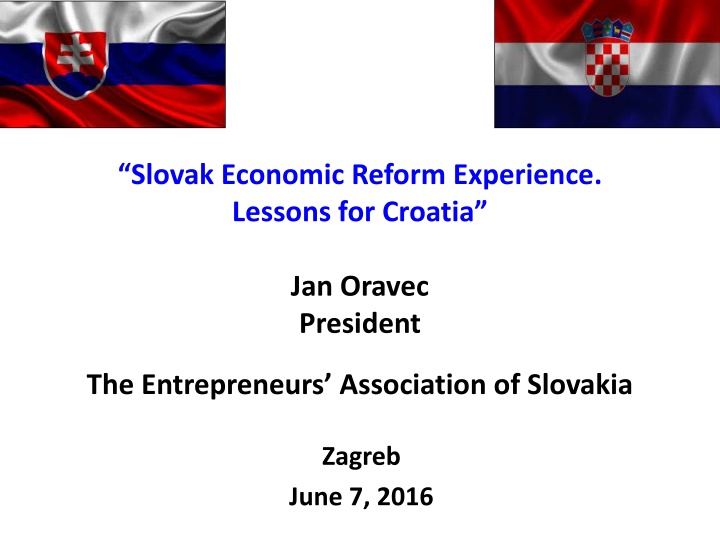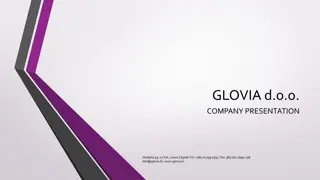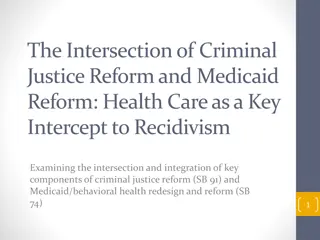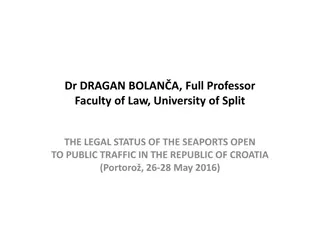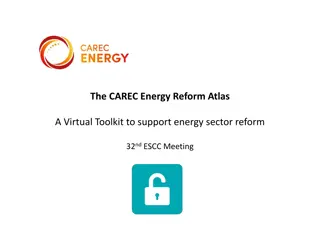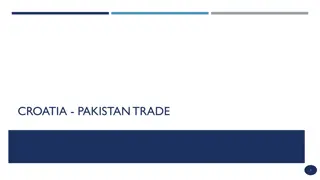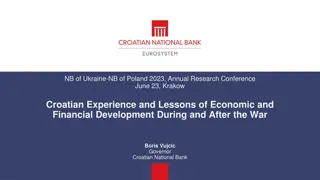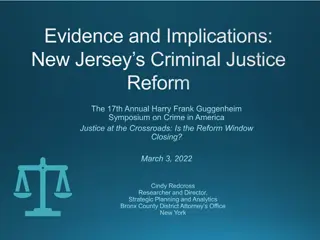Slovak Economic Reform Experience: Lessons for Croatia
This presentation by Jan Oravec, President of The Entrepreneurs Association of Slovakia, delves into the economic reform journey of Slovakia and offers valuable insights and lessons that Croatia can learn from. The talk was delivered in Zagreb on June 7, 2016, highlighting key aspects of Slovakia's economic transformation that may be applicable to Croatia's development strategies.
Download Presentation

Please find below an Image/Link to download the presentation.
The content on the website is provided AS IS for your information and personal use only. It may not be sold, licensed, or shared on other websites without obtaining consent from the author.If you encounter any issues during the download, it is possible that the publisher has removed the file from their server.
You are allowed to download the files provided on this website for personal or commercial use, subject to the condition that they are used lawfully. All files are the property of their respective owners.
The content on the website is provided AS IS for your information and personal use only. It may not be sold, licensed, or shared on other websites without obtaining consent from the author.
E N D
Presentation Transcript
Slovak Economic Reform Experience. Lessons for Croatia Jan Oravec President The Entrepreneurs Association of Slovakia Zagreb June 7, 2016
SLOVAKIA-CROATIA Four parallel historical and non-precedent transitions : 1. transition from a totalitarian Communist regime to a multiparty democracy 2. transition from a federation to an independent state 3. transition from a centrally planned economy to a market economy 4. transition from state paternalism to individual responsibility. Facing just one of these challenges would be more than enough for one generation.
SLOVAKIA 1993 1993 2003 u One Century Compressed Into One Decade Shining Star of Reforms Ugly Little Duck of Central Europe
SLOVAKIA 1993-2003-TODAY 1993 SLOVAKIA - OUTSIDER OF THE REGION (as a result of extremely negative expectations concerning future performance of the Slovak economy and predicted overall early collapse of the Slovak economy) 2003 SLOVAKIA - DETROIT OF EUROPE (Volkswagen, Peugeot-Citroen, Kia Motors investing in Slovakia) and HONG KONG OF EUROPE (as a result of the Slovak economic and social reforms) TODAY SLOVAKIA STANDARD EUROPEAN COUNTRY, 2000 OECD 2004 NATO and EU 2009 EURO
1998-2006 1. 1998-2002: 1stwave of fundamental reforms - catching up with other transition countries 2. 2002-2006: 2ndwave of fundamental reforms - putting Slovakia ahead of other transition countries
1998-2002 1st wave of fundamental reforms helping Slovakia to catch up with other transition countries: 1. Macroeconomic stabilisation 2. Privatisation of banking sector, energy sector, and other previously strategic industries and companies 3. Deregulation of sensitive prices 4. Integration into international organisations (OECD, EU).
2002-2006 2ndwave of fundamental reforms putting Slovakia ahead of other transition countries: 1. 2. 3. Flat Tax Reform 4. Pension Reform 5. Education System Reform (1/2) 6. Health Care Reform (1/2) Business Environment Reform Labour Market Reform
Old Tax System Dominated by special regimes and allowances: Tax incentives for job creation, FDIs, deprived areas, etc. Accelerated depreciation allowances for investment in certain assets Favourable treatment of house ownership Tax regimes favouring SMEs
Tax Reform 1. 2. Flat tax of 19 % Simplification of the tax system Old Tax System New Tax System
TAX REFORM January 1, 2004 OLD SYSTEM Personal Income Tax 5 tax brackets (10-38%) Corporate Income Tax 25 %, previously 40 % Dividend Tax 25 % Value Added Tax 20 %, with reduced rate of 14 % Real estate transfer tax progressive taxation Inheritance (Death) Tax, Gift Tax, Various rates NEW SYSTEM Personal Income Tax Flat tax of 19 % Corporate Income Tax 19 % Dividend Tax ABOLISHED Value Added Tax 19 % Real estate transfer tax flat tax of 3 %, ABOLISHED 2005 Inheritance (Death) Tax, Gift Tax, ABOLISHED
TAX RATES FACED BY INVESTORS Slovakia Estonia Finland Hungary Czech Republic Poland Germany Japan UK France Ireland USA (New York) 0% 10% 20% 30% 40% 50% 60% Corporate tax rate Effective tax rate on investment income faced by a private investor (combined corporate tax and dividend tax)
Tax Reform 1. Quick preparation and implementation: September 2002: parliamentary elections January 1, 2004: reform effective 2. Generating pressure on politicians and policy-makers long before (the 2nd half of 90-ies): by NGOs promoting view: there are MAJOR FLAWS in the tax system, it needs FUNDAMENTAL FIX by presenting inovative and attractive reform idea: FLAT TAX by inviting opinion-makers from abroad to support reform change: Steve FORBES, US presidential candidate and owner of The Forbes magazine, campaigning for years with flat tax idea
Reform Follow-Up 2006-2010: the 1st socialist government after 1989 1. Criticising 1998-2006 policies 2. Not reversing their major symbols (tax and pension reforms), introducing minor modifications 2012-2015: the 2nd socialist one party - government 1. Reversal of tax reform 2. Modification of pension reform
PENSION REFORM Pension assets in SVK/GDP, 2010 as of January 1, 2005 privately owned personal pension accounts were created 65 % eligible citizens (1.5 mil.) opted for reformed system 50 % of their old age pension contribution (9 % of gross wage) was redirected from public to private pension system The most robust contribution in Europe
Pension Reform 1. Quick preparation and implementation: September 2002: parliamentary elections January 1, 2005: reform effective 2. Generating pressure on politicians and policy-makers long before (the 2nd half of 90-ies): by NGOs promoting view: there are MAJOR FLAWS in the pension system, it needs FUNDAMENTAL FIX by presenting innovative and attractive reform idea: individually owned personal pension savings accounts by inviting opinion-makers from abroad to support reform change: Jos PINERA, the first architect of the successful pension reform
PENSION REFORM 2006 The 1st political test: the reformed system survived the first socialist government 2010 A liberal-conservative government reversed some of the changes introduced by socialist government 2012 Early elections, the 2nd socialist government: Contributions reduced from 9 to 4 % as of Sept 1, 2012 Future increase of rates guaranteed by constitutional amendment agreed across political spectrum: 2017 2018 2019 2020 2021 2022 2023 2024 4.25 4.5 4.75 5.0 5.25 5.5 5.75 6.0
Reforms In Slovakia Overall Very Positive Impact, Internally as well as externally scales _ +
3 crucial conditions necessary for reforms 1. Open crisis - 1993-1998 (irresponsible macroeconomic policies, lack of microeconomic adjustments) and a sense of urgency of general public 1. Inspirations: 2. Responsive politicians ready to implement changes
LESSONS Significant and quick improvements are possible Reforms must be fundamental and quick (no gradualism and incrementalism) Reforms must bring early results Slow implementation of reforms undermine their sustainability in future Even the best reforms tend to deteriorate, nothing is irreversible Mechanisms deterioriating need to be introduced to prevent achievements from
POLICY MAKING TODAY FOUR DEADLY SINS OF POLITICIANS 1. Ignorance of reality, creation of new myths 2. Inability to resist to a. paternalism in minds of citizens, b. rent-seeking by many businesses 3. Implementation of policies of interventionism and massive redistribution 4. Buying voters by taxpayers money
RESULTS OF Ignorance of Common Sense Ugly world for businesses: more regulation more government restrictions more and higher taxes increased costs of doing business limited economic freedoms
SLOVAKIA-CROATIA COMMON CHALLENGES 1. GOOD REFORMS IMPLEMENTED IN THE PAST SHOULD BE PRESERVED 2. REFORM EFFORTS OF OTHER COUNTRIES MUST BE MONITORED AND 3. NECESSARY (FREEDOM ENHANCING!) REFORMS MUST BE IMPLEMENTED
FUTURE The next wave of fundamental reforms needed 1. 2. 3. To improve competitivensess To adjust to economic slowdown To adjust unsustainable unfunded (social) liabilities
ECONOMY NEEDS 1. Equal level playing field 2. Elimination of barriers 3. Elimination of policies that DISCRIMINATE majority of entrepreneurs by FAVOURING few (subsidies, grants, tax and other exemptions) 4. Encourge entrepreneurial spirit
SLOVAKIA-CROATIA ULTIMATE AMBITION Economic policy driven by one goal Croatia/Slovakia To TOP TEN in all competitiveness indeces!
Thank you for your attention! zps@zps.sk joravec64@gmail.com 01
